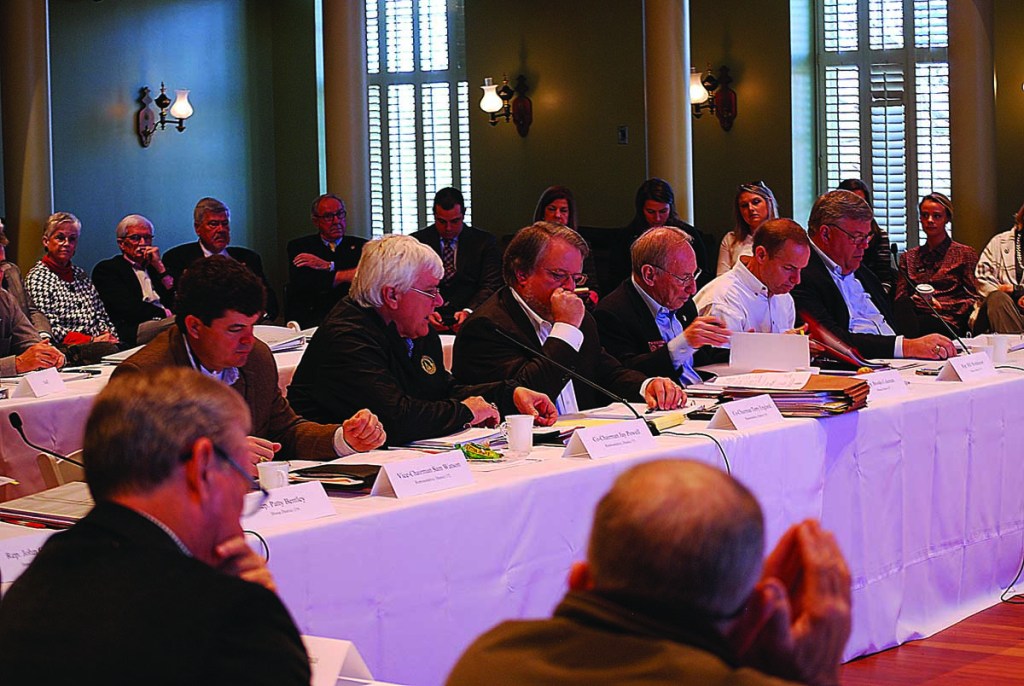Panel signs off on plan to bolster rural Georgia
Published 9:16 pm Wednesday, December 13, 2017

- State Rep. Jay Powell, R-Camilla, second from left, speaks at the last meeting of the House Rural Development Council held at the Old Capitol Building in Milledgeville. The council’s report, approved Wednesday, provides a framework for the coming legislative session. At left is state Rep. Sam Watson, R-Moultrie, vice chairman of the council. Between them, Powell and Watson represent all of Colquitt County, as well as other areas.
MILLEDGEVILLE, Ga. – A legislative panel focused on the challenges facing rural Georgia has proposed a slate of changes meant to spark job growth and reverse population declines in the state’s beleaguered counties.
A report, approved Wednesday by the House Rural Development Council, takes on such mammoth issues as rural health care and spotty broadband Internet service.
That document provides a framework for the initiatives that will be debated in the coming legislative session, which starts next month.
“I’m going to be counting on you for your help,” House Speaker David Ralston said to lawmakers Wednesday. “Your legacy as a council will be the improvements that we bring to rural Georgia.
“Keep in mind that the ultimate goal of this group – the ultimate goal – is empowering private business to expand and grow jobs in rural Georgia and lift the quality of life for a major, major part of this state,” he also said. “And that’s what we have to keep our eye on.”
Wednesday marked the culmination of a series of meetings held across the state since May. The council’s work is expected to lead to as many as five major bills this session that are focused on workforce development, broadband deployment, economic development, education and health care. Other smaller bills are also likely.
Specific ideas include proposals such as creating a tax break for people who move to counties with a steady stream of residents leaving. It’s an incentive especially meant to attract high-wage professionals to rural communities.
Or easing requirements in the state’s certificate of need program, which controls how many health care facilities can crop up in one area. That proposal is designed to give rural hospitals more flexibility to operate as small-scale “micro hospitals.”
Rep. Jay Powell, R-Camilla, who co-chairs the council, said no recommendation takes priority over another.
“It’s a package,” Powell said after Wednesday’s meeting held in Milledgeville. “There are some things that are going to be a harder lift than others.”
The council’s strategy for incentivizing broadband expansion in underserved areas, he said, will likely be one of the tougher measures. The plan calls for changing the tax structure, establishing a grant program, prioritizing communities based on need and, finally, figuring out what it will all cost.
“That’s going to be a challenge, but it’s very important that we meet that challenge,” Powell said.
One specific proposal, for example, recommends expanding the telecommunications tax rate for all providers – including satellite providers.
Proposing changes to the state’s certificate of need program for health care facilities is another controversial subject that council co-chair Terry England, R-Auburn, acknowledged might have left some legislators – including himself – “sweating very profusely.”
The program is seen as a vital protection for the state’s fragile rural hospitals, but England said that, as is, the program also limits forward-thinking ideas, such as the micro hospital concept.
The council’s proposal would create a two-tier system that keeps the program in place for areas with less than 85,000 people.
Proposals such as these will no doubt lead to lively discussions in the coming months, and Rep. Jason Shaw, R-Lakeland, said such sweeping policy changes will naturally lead to some winners and losers.
“We have to keep in mind, as we deliberate and talk about these issues and recommendations, that we should look at it as a whole,” Shaw said. “Is what we’re doing moving the needle forward? And let’s not get too bogged down on just individual issues here.”
The council’s report left others feeling hopeful.
“What we’re doing now is not working,” said Rep. Sam Watson, R-Moultrie, who is vice chair of the council. “I’m excited about the possibility of having recommendations that we can move forward on and do something different to hopefully make a difference.”





